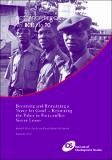| dc.contributor.author | Charley, Joseph. P. Chris | |
| dc.contributor.author | M'Cormack, Freida Ibiduni | |
| dc.coverage.spatial | Sierra Leone | en_GB |
| dc.date.accessioned | 2014-08-13T15:41:13Z | |
| dc.date.available | 2014-08-13T15:41:13Z | |
| dc.date.issued | 2011-10-07 | |
| dc.identifier.citation | Charley, J. P. C. and M'Cormack, F. I. (2011) Becoming and Remaining a 'Force for Good': Reforming the Police in Post-conflict Sierra Leone, IDS Research Report 70, IDS: Brighton | en_GB |
| dc.identifier.issn | 978 1 78118 001 3 | |
| dc.identifier.uri | https://opendocs.ids.ac.uk/opendocs/handle/20.500.12413/4277 | |
| dc.description.abstract | The Sierra Leone Police Force has its origins in the British colonial administration of the country. After Independence and with the consolidation of one-party rule the force slid into disrepute. The outbreak of civil conflict in 1991 largely decimated the force but the gradual restoration of peace provided an opportunity for police reform.
This research report covers the aspects of the political and institutional environment that helped engender change, as well as constraints faced by the reform agenda. It considers how the officers actually carried out the task at hand, and shares lessons as to what reform tactics worked and which were less successful.
While several challenges remain, the reform programme, centred around local needs policing has been largely successful, hinging on – among other factors – the appointment of a British Inspector General of Police, perceived to be neutral and above political machinations, supported by a core of reformminded officers; long-term external technical and financial assistance; and a conducive political environment for change. | en_GB |
| dc.description.sponsorship | Thie report was produced under the auspices of the RCUK Global Uncertainties
Programme on Security in an Africa of Networked, Multi-Level Governance. | en_GB |
| dc.language.iso | en | en_GB |
| dc.publisher | IDS | en_GB |
| dc.relation.ispartofseries | IDS Research Report;70 | |
| dc.rights | All rights reserved. Reproduction, copy, transmission, or translation of any part of this publication may be made only under the following conditions:
• with the prior permission of the publisher; or
• with a licence from the Copyright Licensing Agency Ltd., 90 Tottenham Court Road, London W1P 9HE, UK, or from another national licensing agency; or
• under the terms set out below.
This publication is copyright, but may be reproduced by any method without fee for teaching or nonprofit purposes, but not for resale. Formal permission is required for all such uses, but normally will be granted immediately. For copying in any other circumstances, or for re-use in other publications, or for translation or adaptation, prior written permission must be obtained from the publisher and a fee may be payable. | en_GB |
| dc.rights.uri | http://www.ids.ac.uk/files/dmfile/IDSOpenDocsStandardTermsOfUse.pdf | en_GB |
| dc.subject | Governance | en_GB |
| dc.subject | Politics and Power | en_GB |
| dc.subject | Security and Conflict | en_GB |
| dc.title | Becoming and Remaining a 'Force for Good': Reforming the Police in Post-conflict Sierra Leone | en_GB |
| dc.type | IDS Research Report | en_GB |
| dc.rights.holder | IDS | en_GB |
| dc.identifier.externaluri | https://www.ids.ac.uk/files/dmfile/rr70.pdf | en_GB |
| dc.identifier.team | Governance | en_GB |

